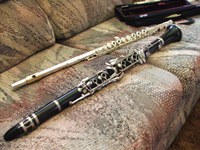Prairie Fare: Music is Good for Your Health
(Click an image below to view a high-resolution image that can be downloaded)
By Julie Garden-Robinson, Food and Nutrition Specialist
NDSU Extension Service
I heard a high-pitched “beep beep beep” sound one day while I read the newspaper. I could tell the sound did not emanate from the smoke detector, the timer on our oven or the alarm on our refrigerator door. What was beeping?
I didn’t smell smoke, so I didn’t rise from my chair. As I turned the page of the newspaper, I heard the beeps again. The tone of the beeps sounded like the warning signal of a garbage truck backing toward a Dumpster.
I was in my living room, so I was reasonably certain I was not in danger of being run over by a garbage truck. Our housekeeping hasn’t fallen to that level yet, anyway.
I needed to investigate. Just as I walked into our music room, I saw my 12-year-old daughter holding her clarinet while seated on the floor near her computer tablet.
I learned that she was setting the timer on her tablet, which signaled her when to play. After two seconds of beeps, she began recording her clarinet music assignment on her computer. Then she emailed the digital music file to her teacher.
Times have changed since the days I was a budding flutist and pianist. Back in the days of the dinosaurs when I was her age, we did not have this type of technology.
I could not be more pleased that she, as well as our other two kids, shares our family’s longtime interest in music. Many of my relatives were music teachers. If I weren’t involved in teaching people about nutrition, food safety and health, I might have become a music teacher.
For those of you who ever sang in the choir or lugged a trombone, saxophone, violin or any musical instrument home to practice, be aware that your experience probably had far-reaching effects on your brain and school success.
In the “Music Makes Us” study, researchers studied the effects of participation in music on a variety of academic success factors among children in the Nashville, Tenn., metropolitan area. The researchers found that participating in music improved school performance, as shown by higher grades and scores on the ACT standardized college entrance exam. The music students had better school attendance records, fewer disciplinary issues and higher graduation rates.
The Nashville students involved in music reported better ability to stay focused and remain calm in stressful situations. After music class, the students felt happier and more relaxed.
Maybe you retired your singing voice or never sang at all. Perhaps your musical instrument was sold at a garage sale long ago. Be aware that listening to music can have positive effects on your mental as well as physical health.
Many studies have shown that music can help reduce stress. For example, Swedish researchers found that listening to 30 minutes of music helped reduce the level of cortisol (a stress hormone) among patients who had undergone open-heart surgery.
Other studies have shown that music can help decrease the fear people may have prior to having surgery. Researchers have reported that listening to music can help prevent a rise in blood pressure due to stress prior to surgery. Listening to relaxing music may help with pain management post-surgery, too.
Music also has been used therapeutically for people dealing with the memory issues associated with dementia and Alzheimer’s disease. According to practitioners, music may have positive effects on people experiencing memory decline and confusion.
Do you ever listen to or play music? Maybe you enjoy resting with some soft music playing in the background. Perhaps you turn on your favorite music when you need an energy boost prior to dusting and vacuuming your home. Maybe you put on a headset with your favorite tunes before you go for a walk or run.
Music is good for your body, mind and soul. Dust off that old clarinet and wake up your neighbors with a concert. Or learn how to play a clarinet.
What recipe goes with a column about music? How about a recipe featuring beans, the “musical fruit”? Dry edible beans of all kinds are excellent sources of fiber and nutrients that can help prevent heart disease and cancer.
Actually, dry edible beans do not necessarily live up to their reputation for producing gas. Just as learning music takes practice, your body needs time to adjust to increasing your fiber intake. Boost your fiber intake slowly and drink plenty of water.
For now, turn on some music, relax and enjoy a delicious black bean brownie.
Black Bean Brownies
1 (15- to 16-ounce) can black beans, drained and rinsed
3 eggs
3 Tbsp. canola oil or other salad oil
1/4 c. cocoa powder
1 pinch salt
1 tsp. vanilla extract
3/4 c. white sugar
1 tsp. instant coffee (optional)
1/2 c. semisweet chocolate chips
Preheat oven to 350 F. Lightly grease an 8- by 8-inch baking dish. Combine all ingredients except chocolate chips in a blender or mixer. Mix until smooth. Grease or spray pan with nonstick cooking spray. Pour mixture into pan, then sprinkle with chocolate chips. Bake in a preheated oven until top is dry and sides start to pull from the baking pan, about 30 minutes.
Makes 16 servings. Each serving has 140 calories, 6 grams (g) fat, 3 g protein, 20 g carbohydrate, 2 g fiber and 105 milligrams sodium.
(Julie Garden-Robinson, Ph.D., R.D., L.R.D., is a North Dakota State University Extension Service food and nutrition specialist and professor in the Department of Health, Nutrition and Exercise Sciences.)
NDSU Agriculture Communication - Oct. 1, 2015
| Source: | Julie Garden-Robinson, (701) 231-7187, julie.garden-robinson@ndsu.edu |
|---|---|
| Editor: | Ellen Crawford, (701) 231-5391, ellen.crawford@ndsu.edu |



